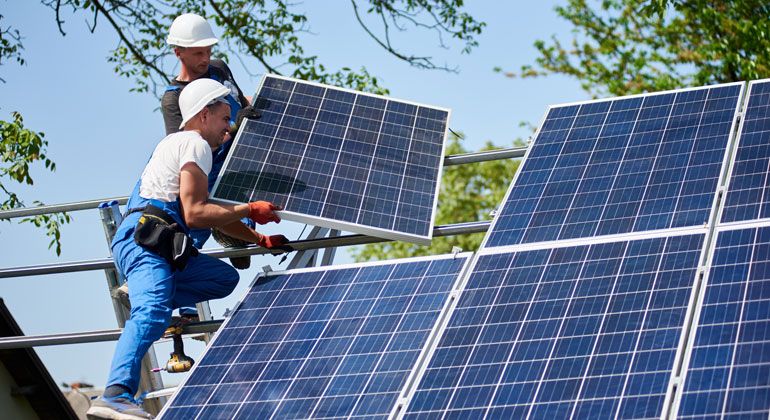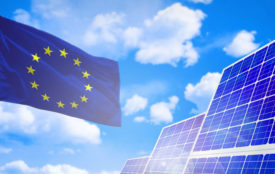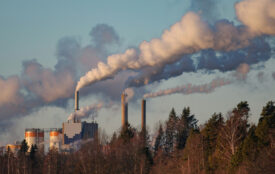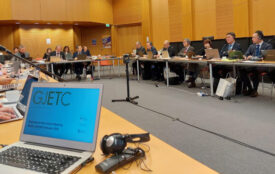Race Towards Climate Neutrality Is Underway: CCPI’s top countries lead the way
The 17th edition of the Climate Change Performance Index, by Germanwatch and NewClimate Institute, monitors climate mitigation progress of 60 countries and the European Union.
Scandinavian countries, together with the United Kingdom and Morocco, lead the ‘race to zero’ / Australia, South Korea, Russia, Saudi Arabia and Kazakhstan are among the worst performers.
Scandinavian countries are leading the way in climate protection, together with Morocco and the United Kingdom. Leaders Denmark, Sweden and Norway occupy ranks four to six in the new Climate Change Performance Index (CCPI) 2022, presented today by Germanwatch, NewClimate Institute and Climate Action Network (CAN). Places one to three again remain vacant because no country’s measures, thus far, have been sufficient to achieve an overall ‘very high’ rating with none following a path necessary to keep global warming within the 1.5°C limit.
‘Many countries have set ambitious targets,’ says Jan Burck (Germanwatch), one of the CCPI authors, ‘and we’re now at the beginning of the decade of implementation. Some countries are doing much better than the rest of the world. Our index also shows that the race towards climate neutrality has begun.’
Scandinavian countries achieved the best results, mainly thanks to their outstanding efforts on renewable energy. Notably, Norway stands out as the only country to be awarded a ‘very high’ rating in this category. The Islamic Republic of Iran and the Russian Federation are the worst-performing countries on renewable energy, with a ‘very low’ rating. The United Kingdom and Morocco, ranked 7th and 8th overall, were among the leaders in all categories. The UK is even a leader in reducing greenhouse gas emissions.
‘Nevertheless,’ CCPI-author Dr. Niklas Höhne from NewClimate Institute cautioned, ‘the UK is only in the middle of the pack regarding renewable energy and lacks policies to reach its own targets. This shows that no country can sit back and relax. Every nation has some catching up to do.’
In the overall rankings, Australia, South Korea and Russia are among the lowest performers, along with Kazakhstan and Saudi Arabia. Australia, notably, receives ‘very low’ ratings in every CCPI category and slips four places in the overall ranking. The Netherlands and Greece are the biggest climbers, while Latvia, Croatia, Belarus and Algeria fell in most of the category rankings. Of the G20 countries, only the UK, India, Germany and France rank among the high performers, whilst six G20 countries are very low performers. Hungary, Poland the Czech Republic and Slovenia are this year’s worst-performing EU countries.
Stephan Singer (CAN) assesses: “The same countries that are among those with the worst climate performance, are identical with the globally largest fossil fuel exporters and large fossil fuel users like US, Saudi Arabia, Russia and Australia. They also belong to the group of those countries that have the highest per capita energy consumption and CO2 fossil fuel emissions as well as much lower renewable energy and energy efficiency achievements. For CAN it is clear, that a serious implementation of 2030-Targets in line with a 1.5°C-strategy would break the backbone of the economic and politically bribing power of the fossil fuel industry. Only with fast and real progress towards deep emissions reductions in this decade and rapid expansion of renewables will it be possible to meet the 1.5C° survival objective.”
In the CCPI’s Climate Policy category, a number of ambitious states have resolutely embarked on paths towards climate neutrality, including the Scandinavian states, Morocco, the Netherlands, Portugal and France. Germany and the EU follow at some distance in the upper mid-levels. However, five EU states are also ‘very low,’ the worst ranking: Bulgaria, Hungary, Poland, Romania and the Czech Republic. At the bottom of the table are: Australia – with the worst possible score of 0.0 – behind Brazil and Algeria.
The world’s largest CO2 emitter, China, slips four places to 37th, with an overall ‘low’ rating. Its biggest problem areas are high emissions and very poor energy efficiency. In both areas, the 2030 targets are also far from a Paris Agreement-compatible pathway. In contrast, China’s trend in renewable energy is very good. For the second-largest emitter, the United States, the first year of the Biden Administration has had a positive impact. In last year’s CCPI, the US was at the bottom, but this year it climbs six places to 55th, though remaining ‘very low’ in the ranking.
‘The US’s improvement thus far in the Index is entirely down to its much better policy rating,’ Thea Uhlich from Germanwatch, co-author of the index, says. ‘We’ll see in the coming years whether Biden’s policies actually bear fruit in renewables, energy efficiency and ultimately in emissions.’

India retains its 10th place in the ranking and is a high performer except in the renewable energy category, where it is rated ‘medium’. The country still benefits from its relatively low per capita emissions. However, in the mid-term trend, these are set to rise and only the ambitious implementation of strong climate targets can save it from a fall in the table. PM Modi’s announcements on increased 2030 targets sound promising, but are not yet included in the ranking. The new targets will now need to be backed up by sector roadmaps.
The Climate Change Performance Index by Germanwatch and NewClimate Institute, published together with CAN International, analyses and compares the climate mitigation efforts of 60 countries plus the EU. This group of nations has the world’s highest emissions and collectively accounts for more than 90% of global greenhouse gas emissions. The four categories assessed are GHG Emissions (40%), Renewable Energy (20%), Energy Use (20%), and Climate Policy (20%). As the 2022 Index analyses emissions data from 2019, the COVID-19 pandemic-related decline in global emissions is not yet accounted for in. However, various studies (such as the Climate Transparency Report) show a rebound effect occurring this year, with emissions in some countries even rising above pandemic pre-levels.
- Access Publication: Climate Change Performance Index 2022
- Background and Methodology
- All Climate Change Performance Indices








